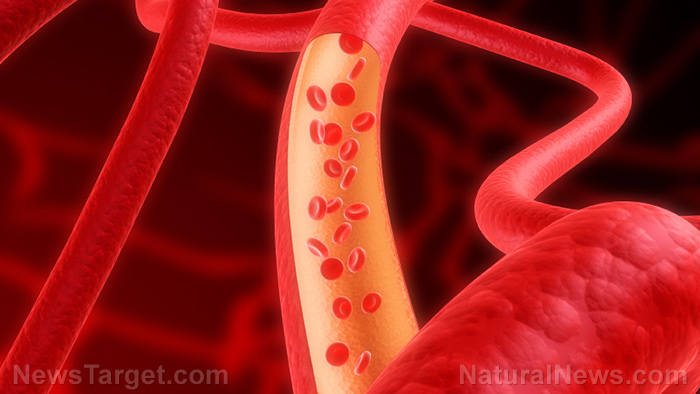Can you balance your brain chemistry with nutrition? Compounds in broccoli sprouts found to help people with schizophrenia
10/27/2019 / By Evangelyn Rodriguez

Research regarding the mechanisms involved in schizophrenia has come a long way. Scientists have now discovered a set of chemical imbalances present in the brains of schizophrenic patients that are linked to the neurotransmitter glutamate. They have also identified a compound that can potentially correct these imbalances and aid in the treatment of schizophrenia. The isothiocyanate sulforaphane, found abundantly in many cruciferous vegetables such as broccoli sprouts, not only has anti-cancer activities, it also increases the levels of the antioxidant glutathione — a physiologic reservoir of glutamate — which is found lacking in the brains of schizophrenic patients.
The link between glutamate, glutathione, and schizophrenia
Schizophrenia is defined by the National Institute of Mental Health as a chronic and severe mental disorder that affects the way a person feels, thinks and behaves. Patients with schizophrenia typically exhibit abnormal behavior, hallucinations, reduced speaking ability, movement disorders, and cognitive impairments. Although it is not as common as other mental disorders, schizophrenia can be disabling.
Glutamate is the most abundant excitatory neurotransmitter in the central nervous system. Nerve cells in the brain use glutamate to communicate, and this all-powerful chemical is involved in learning and memory. Parts of the brain affected by schizophrenia are connected by nerve cells that rely on glutamate. However, glutamate levels are found to be low in these areas and progressively decrease with age, indicating loss of synaptic activity.

|
Discover how to prevent and reverse heart disease (and other cardio related events) with this free ebook: Written by popular Natural News writer Vicki Batt, this book includes everything you need to know about preventing heart disease, reversing hypertension, and nurturing your cardiac health without medication. Learn More. |
According to researchers from Johns Hopkins University (JHU) in Maryland, glutathione is a relevant reservoir of glutamate that can potentially restore synaptic excitability. In their study, which appeared in PNAS, they found that the glutathione cycle can compensate for decreased excitatory neurotransmission by replenishing glutamate in the brain. This suggests the possibility of using glutathione as a means of improving glutamate levels in the brains of patients with schizophrenia.
However, decreased glutathione levels have also been observed in schizophrenia. Multiple studies have reported a reduction in glutathione in schizophrenic patients, particularly in peripheral tissues and the blood. Glutathione is a major antioxidant and a potent regulator of oxidative stress. Oxidative stress is believed to be a major contributor to the development of several brain and mental disorders, including Alzheimer’s disease and schizophrenia.
Sulforaphane may be the key to restoring glutamate levels in the brains of schizophrenic patients
In an attempt to address the insufficiency of glutathione levels observed in schizophrenia, a team also from JHU investigated the effects of sulforaphane, which has shown promise in preclinical models of traumatic brain and spinal cord injury. They hypothesized that this component of cruciferous vegetables could increase glutathione levels in the blood and brains of human subjects.
For their study, the researchers recruited nine healthy volunteers and gave them supplements containing sulforaphane from broccoli sprouts to take twice daily for seven days. Although the participants reported having stomach issues when they took the supplements on an empty stomach, the sulforaphane supplements were well-tolerated. (Related: Natural broccoli compound sulforaphane provides temporary relief from autistic symptoms.)
After a week of supplementation, the researchers found that sulforaphane increased the average glutathione levels in the participants’ brains. They also observed significant increases in different parts, such as in the hippocampus, the anterior cingulate cortex, and the thalamus. Blood glutathione levels also increased with supplementation, suggesting that the isothiocyanate sulforaphane can influence functional measures that are altered in neuropsychiatric disorders. These results also indicate that adding sources of sulforaphane to the diet of schizophrenic patients may provide substantial benefits.
BrainHealthBoost.com has more info on how to improve brain function naturally.
Sources include:
Tagged Under: alternative medicine, antioxidant, brain function, brain health, brain health boost, broccoli sprouts, chemical imbalance, cognitive health, cruciferous vegetables, disease treatments, food cures, food is medicine, food science, functional food, Glutamate, Glutathione, isothiocyanates, Mental Disorders, natural cures, natural medicine, nerve function, nervous system, neurotransmitter, nutrients, oxidative stress, phytonutrients, research, schizophrenia, sulforaphane, supplements, veggie, Veggies


















